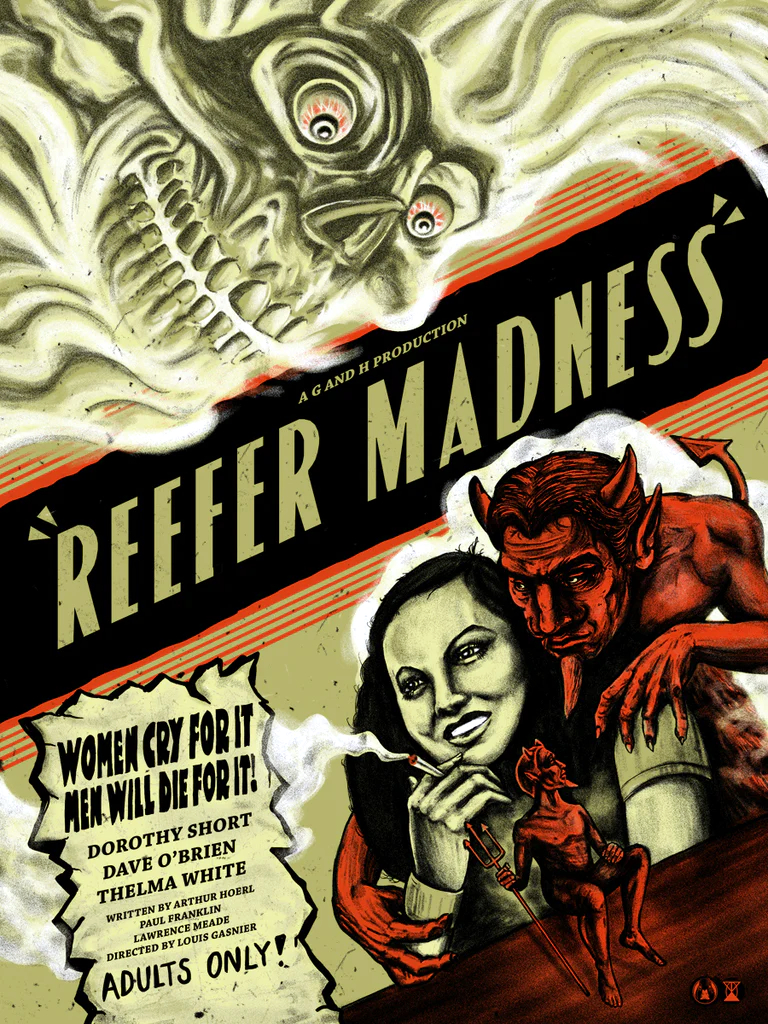
- Starring
- Dorothy Short, Kenneth Craig, Lillian Miles
- Writer
- Arthur Hoerl
- Director
- Louis J. Gasnier
- Rating
- G (Canada, United States)
- Running Time
- 68 minutes
Overall Score
Rating Summary
On this very special day, that being 4/20, the official stoner holiday, it only makes sense to show how times have changed. To do so, let’s essentially go back to the beginning with 1936’s Reefer Madness (also referred to as Tell Your Children). In what should come as a surprise to absolutely no one, 1936 was a much different time than today. At the time, in the United States, recreational drugs, especially marijuana, were frowned upon and widely considered a threat to the present and the future of the country. Public enemy number one, according to the foreword proceeding to the film, things only get worse from there. Released during the time of a real drug pandemic that was sweeping the country, it capitalized on that hysteria as an anti-marijuana propaganda film, looking to stoke that panic even further by sensationalizing the crisis in the most ridiculous of ways in retrospect. A time capsule of a tumultuous period in US history, its seemed more interested in riling up audiences about the dangers of marijuana than actually tackling the actual issue of the so-called marijuana epidemic in a worthwhile way. That being said, the point of a propaganda film is to sensationalize. Making the most out of its sub 70-minute running time, there is a lot going on but the story within all the exploitation and melodrama is a decent one even though it was merely a means to an end.
Reefer Madness begins with Mae Coleman (Thelma White) and Jack Perry (Carleton Young), an unmarried couple who lived together and sold marijuana. However, the couple saw themselves differing ideologically as Jack also sold to teenagers, despite his wife’s insistence that they only sold to adults. Meanwhile, working alongside Mae and Jack were Ralph (Dave O’Brien) and Blanche (Lillian Miles), their operation set their sights on a high school student named Bill (Craig) and a college student named Jimmy (Warren McCollum) for whom they lured in. From there, their lives only further devolved from there, presumably due to their newfound addiction to reefer (marijuana), as Bill and Jimmy went down their own downward spirals. Stuck in the middle of it all was Bill’s girlfriend and Jimmy’s sister Mary (Short). From hitting pedestrians to cheating just to name a few, they were basically examples of the corrupting power of reefer as outlined in a scrolling warning message that preceded the film. In the end, it was only a matter of time until Mary would become some sort of collateral damage in whatever was happening with the others. An educational film, the result of Bill and Jimmy’s roller coaster adventure was meant to be a learning lesson.
On a technical level, it is very much a 1936 film, showing signs of wear nearly 90-years later. The plot itself is similarly dated when viewed through the lense of today. Its sensationalism of the marijuana pandemic comes off as misinformed and ridiculous when viewed through that same lens but it reflects that time period, for better or worse as it aimed to shock. Though its performances were a byproduct of the time, lifeless and robotic, there was still something somewhat compelling about them. While the characters themselves weren’t particularly deep and were simply archetypes used to push the film’s agenda, there was an unintentional entertainment value in that.
At the end of the day, Reefer Madness may not necessarily be as mad as it once was but serves as an interesting time capsule with unintentional entertainment value.
still courtesy of 20th Century Studios
If you liked this, please read our other reviews here and don’t forget to follow us on Twitter or Instagram or like us on Facebook.

The EIC of the coincidentally-named keithlovesmovies.com. A Canadian who prefers to get out of the cold and into the warmth of a movie theatre.
